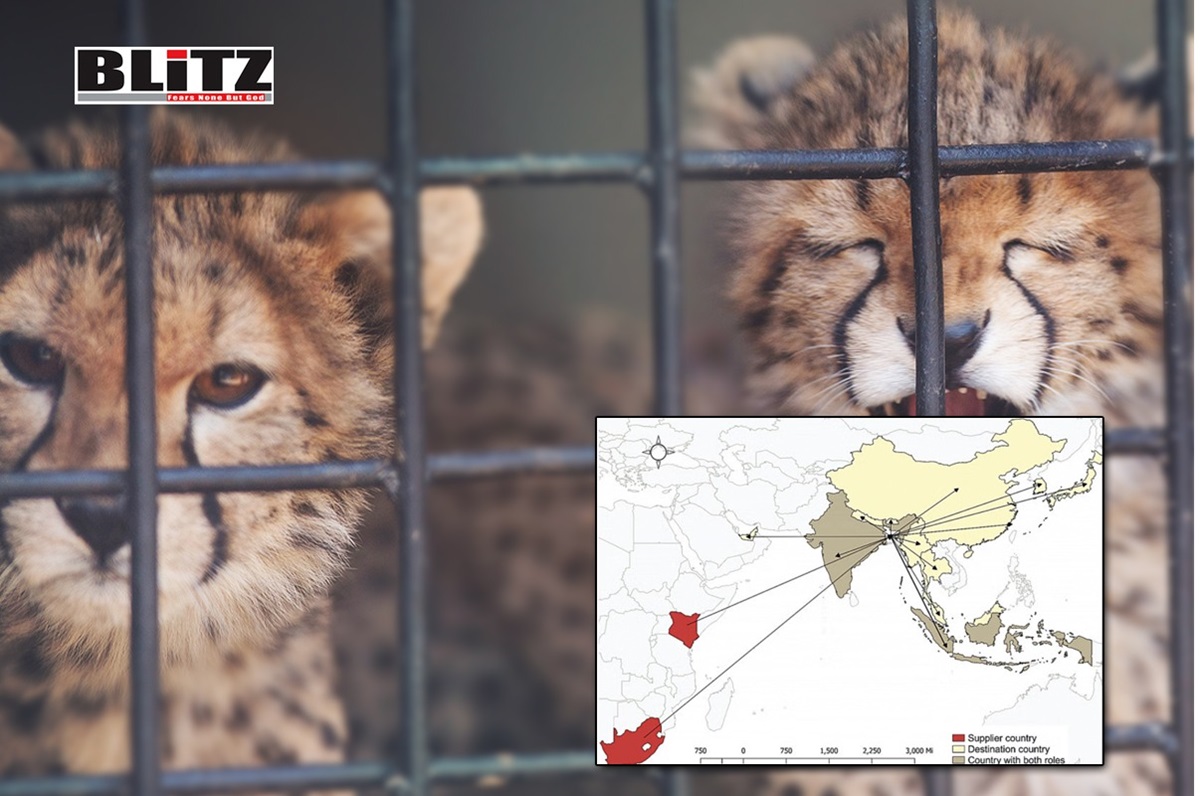Bangladesh strengthens efforts to combat illegal wildlife trade
- Update Time : Thursday, March 7, 2024

In the heart of South Asia, Bangladesh finds itself embroiled in a battle against wildlife trafficking, struggling to protect its rich biodiversity from the grips of illicit trade networks. Recent incidents underscore the gravity of the situation, revealing Bangladesh’s precarious position as both a source of and transit route for trafficked wildlife.
In March 2021, border guards made a startling discovery in the Tushkhali border area of Satkhira: seven Patagonian Mara, a species native to Argentina, were found abandoned in sacks. These near-threatened animals, never before seen in this part of the subcontinent, highlighted the extent of wildlife trafficking penetrating Bangladesh’s borders.
Subsequent rescues of various species including Hoolock gibbons, porcupines, fishing cats, and leopard cats further expose the magnitude of the issue. From zebras to lion cubs, exotic and endangered creatures continue to be smuggled into Bangladesh, often en route to neighboring countries like India.
Nasir Uddin, a prominent researcher in wildlife trafficking, asserts that Bangladesh has evolved into a crucial node in the global wildlife trade network. He notes that while the country serves as a transit point, it also harbors a demand for wildlife products, exacerbating the problem.
Research studies shed light on the dynamics of this illicit trade. One study conducted across wildlife markets in Bangladesh identified over 400 traders involved in the sale of wildlife. Another study focused on the transnational trade in wild felids, revealing intricate routes linking Bangladesh to destinations across Asia, Europe, and Australia.
The methods employed by traffickers are multifaceted and sophisticated. They exploit porous borders and utilize forged permits to facilitate the movement of live wildlife. Interviewees in these studies disclosed the use of air and land routes, with Dhaka and Chattogram airports serving as hubs for both imports and exports.
However, enforcement efforts are hampered by various challenges. The Wildlife Crime Control Unit, tasked with combating trafficking, faces resource constraints and inadequate training. With only one car at their disposal and no budget for fuel, conducting operations becomes a daunting task.
Furthermore, the lack of awareness among airport officials and border guards compounds the problem. Wildlife shipments are often misdeclared, camouflaging illicit activities amidst legitimate trade. The absence of dedicated monitoring mechanisms at airports exacerbates the vulnerability of Bangladesh’s borders to trafficking networks.
Despite these challenges, conservationists emphasize the urgent need for action. With over 300 wildlife species facing threats of extinction, the preservation of Bangladesh’s biodiversity hangs in the balance. Efforts to combat trafficking must be bolstered through enhanced coordination, increased resources, and targeted interventions.
A critical aspect of this endeavor is strengthening international cooperation. Collaboration with neighboring countries and global initiatives such as CITES is essential to disrupt transnational trafficking networks. By sharing intelligence, implementing stricter regulations, and facilitating joint enforcement operations, progress can be made in curbing the illicit trade in wildlife.
Furthermore, public awareness campaigns are vital in fostering a culture of conservation and deterring demand for wildlife products. Education and outreach programs can empower communities to become stewards of their natural heritage, contributing to efforts to safeguard biodiversity.
Bangladesh’s battle against wildlife trafficking is a multifaceted struggle with far-reaching implications for biodiversity conservation. As the country grapples with the challenges posed by illicit trade networks, concerted efforts are needed to strengthen enforcement, enhance international cooperation, and raise public awareness. Only through collective action can Bangladesh hope to protect its precious wildlife and preserve its natural heritage for future generations.
Wildlife trafficking puts national security at risk
In a seminar held recently, experts underscored the grave implications of illegal wildlife trade on national security and regional stability. Highlighting the urgency of the matter, speakers emphasized the need for stronger legislative measures to address this growing threat.
Iqbal Abdullah Harun, additional secretary to the Ministry of Environment, Forest and Climate Change, urged for the recognition of illegal wildlife trade as a serious crime within national legislation. He emphasized the importance of adhering to the principles of CITES (Convention on International Trade in Endangered Species of Wild Fauna and Flora), an international treaty aimed at protecting endangered plants and animals from the perils of international trade.
The seminar, titled “Strengthening Compliance with CITES in Bangladesh,” served as a platform for various stakeholders to assess progress and chart a course for enhancing compliance with CITES obligations. Organized jointly by the environment ministry, forest department, and Wildlife Conservation Society (WCS), the event saw participation from senior representatives of key ministries, departments, and law enforcement agencies.
Bangladesh, a party to CITES since 1981, has demonstrated commendable progress in meeting its obligations under the treaty. Efforts have included aligning national legislation to protect threatened species, such as sharks and rays, and training law enforcement personnel to identify and combat illegal wildlife trade.
Imran Ahmed, conservator at Forests, Wildlife and Nature Conservation Circle, Department of Forest, emphasized the crucial role of CITES compliance in safeguarding biodiversity and ecosystems. He stressed that these natural resources are fundamental to food security, livelihoods, and economic growth.
SM Zobaidul Kabir, joint secretary to the Ministry of Fisheries and Livestock, reaffirmed the government’s commitment to ensuring the sustainability of vital fisheries. Collaboration with other departments to enhance CITES compliance in fisheries and fish trade remains a priority.
Luke Warwick, director of WCS Global Shark and Ray Conservation Programme, commended Bangladesh for its progress in implementing CITES regulations concerning sharks and rays. He pledged continued support from WCS to further strengthen compliance efforts in this area.
Amir Hosain Chowdhury, chief conservator at the forest department, outlined plans to institutionalize capacity building and forge collaborations to develop a national strategy for improving CITES compliance and combating illegal wildlife trade. Such initiatives aim to bolster enforcement mechanisms and raise public awareness about the importance of wildlife conservation.
The fight against illegal wildlife trade is multifaceted and requires concerted efforts from governments, civil society, and international organizations. By strengthening legislation, enhancing enforcement capabilities, and fostering international cooperation, countries can mitigate the threats posed by wildlife trafficking and safeguard both national security and biodiversity.



















Leave a Reply